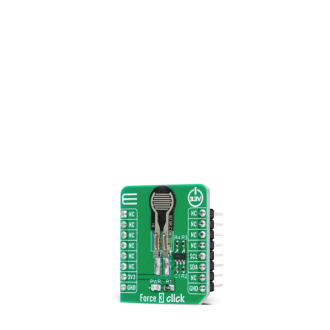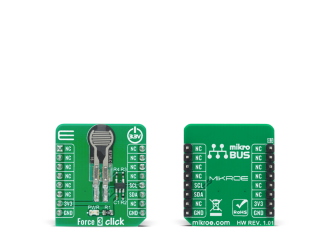
We strongly encourage users to use Package manager for sharing their code on Libstock website, because it boosts your efficiency and leaves the end user with no room for error. [more info]

Rating:
Author: MIKROE
Last Updated: 2020-08-11
Package Version: 1.0.0.0
mikroSDK Library: 1.0.0.0
Category: Force
Downloaded: 2783 times
Not followed.
License: MIT license
Force 3 Click is a compact add-on board with circuitry for implementing Force Sensing Resistor into your projects whose resistance changes when a force, pressure, or mechanical stress is applied.
Do you want to subscribe in order to receive notifications regarding "Force 3 click" changes.
Do you want to unsubscribe in order to stop receiving notifications regarding "Force 3 click" changes.
Do you want to report abuse regarding "Force 3 click".


Library Description
The library contains basic functions for working with the Force 3 click.
Key functions:
uint16_t force3_read_raw_data( ) - Read 12bit raw dataExamples description
The application is composed of three sections :
void application_task ( )
{
uint16_t raw_data;
char demo_text[ 20 ];
raw_data = force3_read_raw_data();
IntToStr( raw_data, demo_text );
mikrobus_logWrite( "Raw data: ", _LOG_TEXT );
mikrobus_logWrite( demo_text, _LOG_LINE );
if ( ( raw_data > 15 ) && ( raw_data <= 200 ) )
{
mikrobus_logWrite( ">> Light touch", _LOG_LINE );
}
else if ( ( raw_data > 200 ) && ( raw_data <= 500 ) )
{
mikrobus_logWrite( ">> Light squeeze", _LOG_LINE );
}
else if ( ( raw_data > 500 ) && ( raw_data <= 800 ) )
{
mikrobus_logWrite( ">> Medium squeeze", _LOG_LINE );
}
else if ( raw_data > 800 )
{
mikrobus_logWrite( ">> Big squeeze", _LOG_LINE );
}
mikrobus_logWrite( "----------------------", _LOG_LINE );
Delay_ms( 1500 );
}
Other mikroE Libraries used in the example:
Additional notes and informations
Depending on the development board you are using, you may need USB UART click, USB UART 2 click or RS232 click to connect to your PC, for development systems with no UART to USB interface available on the board. The terminal available in all MikroElektronika compilers, or any other terminal application of your choice, can be used to read the message.